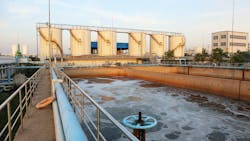Stantec, NAWCA survey cost impacts of PFAS for clean water utilities
The National Association of Clean Water Agencies (NACWA) has released the results of its PFAS Cost Study, according to a press release from Stantec.
The study was led by researchers from the Stantec Institute for Applied Science, Technology, and Policy for NACWA. The study is meant to provide additional guidance to NACWA members to address the challenges and financial implications of managing per- and polyfluoroalkyl substances (PFAS).
The study surveyed NACWA’s member utilities to better understand the cost impacts of PFAS on biosolids management in the US. NACWA previously published a study on this topic in 2020. The new study provides updates to those findings in addition to identifying additional impacts and concerns around PFAS.
The PFAS Cost Study is available online for NACWA members.
“As passive receivers of PFAS, utilities are grappling with a challenge that they were not designed to handle,” said Joan Oppenheimer, vice president and environmental scientist at Stantec. “Despite that, utilities across the country are stepping up to figure out their role in mitigating PFAS release to the environment and, in lieu of readily available treatment technology, what costs are associated with different containment measures.”
Stantec received 103 surveys from utilities, representing 30% of NACWA members in 40 states. According to the findings, nearly 90% of utilities surveyed indicated they were concerned about the anticipated changes to their biosolids treatment capabilities due to PFAS.
However, 58% of utilities that indicated concerns over the impact of PFAS are not monitoring for PFAS in their influent, effluent, or biosolids. This is most likely due to lack of regulatory requirements to sample.
The study also found that most clean water utilities have not yet taken on capital improvement projects in response to PFAS in wastewater and biosolids. Stantec concludes that this is also due to a lack of regulatory drivers, as well as low technology readiness in PFAS destructive technologies.
“The reluctance to begin a lengthy, expensive capital improvement project is a logical response to the regulatory landscape at this time,” said Pooja Sinha, civil engineer at Stantec and co-author of the report. “The technology is still developing, and regulatory bodies have yet to offer definitive guidance in many places.”
The report includes three key recommendations from Stantec researchers for utilities that are trying to develop a plan to treat PFAS, including:
- Clean water utilities should evaluate potential options for diversifying their biosolids management strategies. Voluntary diversification was the only change to biosolids management identified in the survey that, on average, produced cost savings to overall biosolids management costs.
- Utilities should begin high level planning for changes to treatment technologies that may be required by future PFAS regulations.
- Utilities, with the continued support of NACWA, should engage regulators, key stakeholders, and their communities to understand the role that publicly owned treatment works play in the beneficial reuse of water and nutrients. They should also help educate these groups on how as passive receiver entities — rather than generators of PFAS pollution — the burden of compliance should be driven toward elimination of PFAS source inputs to their treatment facilities.
